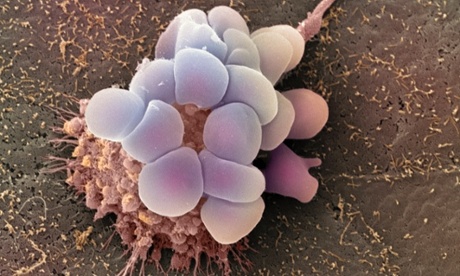Cases of Lyme disease in the UK may be three times higher than previous estimates, according to new research.
After analysing the anonymous medical records of 8.4 million people from across the UK, scientists forecast that the total number of Lyme disease diagnoses in the UK could top 8,000 in 2019, compared with previous estimates of between 2,000 and 3,000 annual diagnoses.
Lyme disease is a bacterial infection, which is passed on through being bitten by an infected tick. The small spider-like creatures feed off the blood of animals and are typically found in dense, moist vegetation.
Lyme disease has many symptoms, making it difficult to diagnose. Early symptoms can be similar to those of flu, and about a quarter of cases will develop a circular red rash around the bite. Full clinical diagnosis requires a blood test, but the study found that more than half of patients in 2012, the most recent year with complete data, were treated with only “suspected” or “possible” Lyme disease.
If caught early, most cases can be successfully treated with antibiotics within four weeks, but the infection can lead to permanent damage to the joints and nervous system.
How common is Lyme disease?
According to Public Health England, no more than 10% of the ticks in question have the bacteria that can then cause Lyme disease. The organisation estimates 3,000 people contract the disease a year in the UK. Diagnoses in the US are much more common, at more than 300,000 a year.
How do the ticks spread the disease?
The ticks cling to grasses or other plants in relatively moist areas (Lyme disease cases have been recorded in all parts of Britain) after hitching rides on deer or other animals. They lie in wait for animal flesh to brush past. When it does, they make the leap, swelling up to the size of a pea as they feast on blood. Doctors advise anyone to check their skin for ticks by sight and by hand and remove them carefully without squeezing their bodies. Only see a GP if a rash or flu-like symptoms then develop – and be sure to mention the bite.
How dangerous is Lyme disease?
Left untreated by antibiotics, the bacteria can spread around the body with various effects including the heart condition Lyme carditis. Deaths are rarer still; a 2011 review of 114 deaths supposedly caused by Lyme disease in the US between 1999 and 2003 concluded that only one could be attributed solely to the effects of the disease.
How do you remove a tick?
Once you find a tick, the key is to remove it as quickly as possible. Use specially made very fine tweezers or you can buy claw-shaped tick-removal tools in pharmacies, outdoor pursuit shops and online. If using tweezers, pull the tick directly upwards – do not twist it – and grab it as close to the skin as possible, to ensure you remove the head and mouth.
The research, published in the journal BMJ Open, found that half of cases occurred between June and August. Although there were diagnoses across all regions of the UK during the period studied, Scotland had the highest number of cases, at 27% of the total. The authors suggest this could be due to the region’s wetter climate and popularity with hikers. The south-west and south of England also recorded a higher than average number of cases.
The data showed that the number of diagnoses increased almost tenfold over the period studied. This, the researchers said, was partly down to increased caution by GPs and greater public awareness.
“The exact number isn’t so important,” said Dr Victoria Cairns, the lead author of the study. “The point is that it’s a lot, and it’s everywhere, and that’s why people should be informed.”
Dr Anne Cruikshank, the Royal College of GPs’ clinical champion for Lyme disease, said: “These levels are not a big surprise to those of us who know about Lyme disease. I expect the 8,000 figure may be an underestimate, since the data shows that positive lab results have doubled every five years.”
Dr Jack Lambert, a professor of medicine at the Mater hospital in Dublin, agreed. “I think this is the tip of the iceberg, but this paper is a good step.”
Lambert, who treats patients with chronic illness linked to Lyme disease, said he was concerned that the Nice guidelines were insufficient for treating people with persistent symptoms. “The Nice guidelines have downplayed Lyme disease,. We need to rethink the whole Nice process.”
Cairns said she hoped the new data would encourage the public to take more preventive measures, and bring about faster diagnoses. “The main thing that should come out of [this work] is to be on the alert. There’s no need to panic, the treatment works – but if you don’t get it in time you might have some long-term problems.”
Advice from Lyme Disease UK
To avoid being bitten:
Wear insect repellent during outdoor activities
Consider spraying clothing with the repellent permethrin
Avoid walking through long grass and stick to pathways
Wear long sleeves and tuck trousers into socks
Shower and check for ticks when you get home
Use tick prevention on pets
If you find a tick:
Use tweezers to pull the tick off as soon as possible, trying not to squeeze its body
Clean the area with antiseptic
Put the tick in a zip-lock bag so it can be tested
Tumble-dry clothes at highest heat or wash at a high temperature
Check the rest of your body for further ticks
If you notice a rash or become unwell, see your GP immediately and raise your concerns about Lyme disease
Draw around any rash with a pen and take photos of any changes
Be aware of flu-like symptoms











